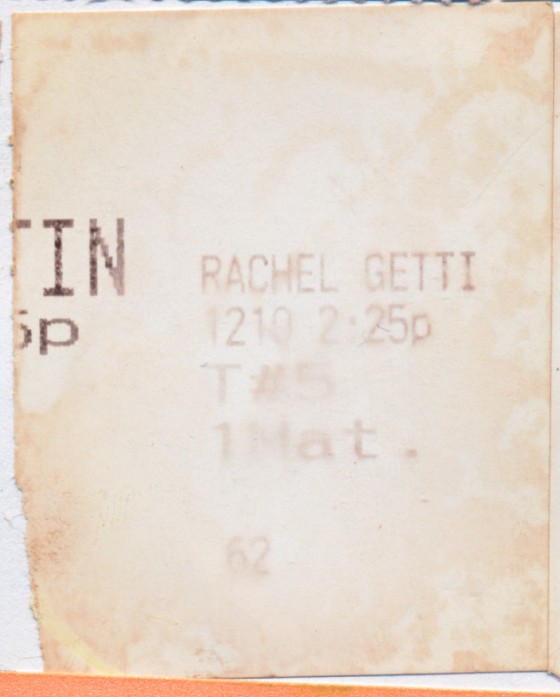Rachel Getting Married

The fault, dear Brutus, lies not in the stars, but in the advice they take from their representation.
There’s a bit in the otherwise forgettable remake of The Manchurian Candidate (let’s, said the filmmakers, make Manchurian the name of an evil corporation, you know because corporations are always doing stuff in politics. It’s an idea that if presented to conservatives even way back in 1962 would elicit the response: “Yes, well, we were hoping for something a little more…controversial.”), where a creepy and somewhat ominous Robyn Hitchcock appears in the background and looks creepy and, well, at very least English. You wonder, who was that? When is he coming back? And why would they update The Manchurian Candidate in 2004 and make it less relevant?
Oh. Answered my own question.

In any case, Robyn Hitchcock’s name appears, somewhat prominently, in the opening credits of Rachel Getting Married. Suddenly I was interested. I spent the rest of the film waiting for him to show. Would he be the older and possibly gay ex-boyfriend? The abusive step-father? The unexplained wedding guest who gives an extremely inappropriate toast about frogs, and then disappears? And I confess, I was somewhat disappointed when he appears very briefly, and as musician who says nothing. What kind of monster would do such a thing?
Who can say which one of us is right? I can, and it’s Bob. And me for saying that it’s Bob.
I had seen RGM on the advice of my friend Bob, who recommended it highly. But I was not enjoying it. Being me, I could tell. But it wasn’t because the film was bad; it was quite good, actually. It’s because I was waiting for a different film which wasn’t coming. Bob enjoyed it because it was the film that he was waiting for. I wasn’t enjoying it because I wanted something else. Who can say which one of us is right? I can, and it’s Bob. And me for saying that it’s Bob.
And so a funny thing happened out the way out of the Regency Agoura Hills 8. I had just seen a film not to my taste. The format for the article was obvious: the film was this, and it should have been this. Describe the good bits, then add a ‘but’. And that’s certainly an acceptable approach, because we all know that criticism is more fun to read than praise. Or at least easier to write. But why not invert that? Let’s turn the ‘but’ into a ‘tub’!
This whole project was started (durst we call it a blog?) to keep the two friends of mine who read it entertained, as well as the fantasy alive that I would become famous writing it. But there have been side effects. One of which is that when I see a movie, I know I’m going to write about it, and it pricks up your eyes, so to speak. You start noticing things that you didn’t see before, and by noticing, appreciating.
As an newly old person, my doctor says that I have to lower my cholesterol, and so after 42 years as a teetotaler, I’ve started to drink wine. And as an egghead, the only way to begin drinking wine for me was to read about it. To simplify greatly, I discovered that there are two schools: the Robert Parker’s of the world, who likes a fruity robust and occasionally artificially generated red, and the likes of Neil Rosenthal, who champion the more subtle tastes of smaller growers.
At first, I went with the underdog, and made ruthless fun of anyone who would dare to read the Wine Spectator. But I soon realized I liked the occasional Barolo. Being a complete novice, you begin to listen very carefully to all the flavors, and without meaning to, I found I could like a bitter taste as well as sweet one. In a certain sense, not only does it not matter what other people think about wine, it doesn’t matter even what I think. There’s something to be found in all flavors.
And so we get back to RGM. It’s not to my taste, but it could be. I like a nice robust narrative. And inasmuch as a director ‘makes’ a film (that’s a myth I can’t wait to shatter), Jonathan Demme made one of the best narratives of all time: Silence of the Lambs (as well as one of the worst, The Truth About Charlie). And walking into a film, you bring your expectations. If they are thwarted, it is a ‘bad’ film. But in watching carefully, I was getting a lot out of the film. Because RSM is a success on its own terms. They didn’t set out to make a narrative film, a film that Scott would like. They set out to capture an event, and the complex characters that create and are created by it, a film that Bob would like. And they succeed.
It’s an extremely subtle film, and that can only be a compliment. There are many opportunities to underline moments or characters, to overexplain, or to explain at all. The semi-bitchy best friend appears at the end walking out of the bathroom in her underwear, and it’s enough that she is simply human and vulnerable. An argument in a hair salon leads to bad highlights for the main character, and they are never referred to again. What may be the crux of the film, the relationship of the two daughters with their estranged mother, does not build to a crescendo, as it might in a melodrama, but to a brief scene of unexpressed yearning: why can’t you stay a moment longer?
Much has been said about the performances in the film, which are restrained, and complex. But they are also complete. You feel a genuine sense of observation, rather than expectation, and it’s credit to everyone involved. It’s a film about a narcissitic character who could destroy her sister’s wedding, and as such compares to last years’ less successful (read bad) Margot at the Wedding. The interesting thing about narcissists isn’t that they feel pain (unfortunately, this is the least interesting thing about narcissists: their ‘reasons’), but that they are not narcissistic all the time. And when Ms. Anne Hathaway is able to tone it down for the actual wedding, it’s not just complex, it feels correct, and well-observed.
Does this palate based approach mean that all films are good? It could, if you want it too, but I think it becomes possible to judge a film not on what you wanted, but on whether it succeeds in what it sets out to do. And using this criteria, RGM does falter at moments. There’s a lot of music, and people from all over the world in the wedding party, but there’s a fine line between celebrating multiculturalism, simply having it and saying nothing, or showing off how multicultural you are, (that’s two lines actually) and near the end, the film briefly becomes a cacophonous mix tape to its own detriment.
And there are limits, even if we take a film at its own value. I’ll always like my type of films better than Bob’s films. And I’m never going to like torture porn, any more than I would drink (shutter) an Australian Red (although that’s not going to prevent me from seeing the undoubtably disastrous Australia tomorrow). But after seeing a film I would not normally like, it may become a film I normally like. Do I want it to be more? Yes, and it could be. But the film absolutely succeeds in what it set out to do. It’s not what I would set out to do, or even what I would want to see someone else setting out and doing, but it is nevertheless a true accomplishment. And I’ll let the people who resonate with the film resonate with it.
And someone, someone, please cast Robyn Hitchcock as something. James Bond, James Bond’s arch-enemy, or James Bond’s ex-boyfriend who gives inappropriate toasts about creepy uncles.
Now that’s a Scott movie.
The Take

$5.00
Thoughts on Rachel Getting Married

 [logo]
[logo]

I had the exact same reaction to this film. Expectations really are something. Ironically, the friend that highly recommended this film to me always waits in the lobby during trailers so he has no idea what he’s eventually going to be seeing.
To me, there’s a new trend going on with these modern loose films, and that is a complete sense of self-awareness. If you go back to films like The Celebration, nobody had any idea what they were really doing. Now that more and more people are jumping on the bandwagon of spontaneity fishing, not only has the aesthetic language has been completely pre-defined, but the performances are self conscious (as there are many examples for comparison). In the end, no matter what the style, it’s all still make believe, and I suppose it’s far more impressive to me if the intent is assured and developed through and through versus simply doing an admittedly great job at creating a scenario for actors to play.
I used to do the trailer thing, but I see so few movies that I don’t get overloaded with information. Except for the trailer for Seven Pounds, which tried so hard to be clever and gave away EVERYTHING.
I actually think they did a pretty good job with Rachel, though it’s not totally my kind of film. You may be right though about the self-awareness. Maybe people need to be more into doing the movie for fun. I’ve said it before, and I’ll say it again – more Bruce Campbell’s, less Peter Berg’s.